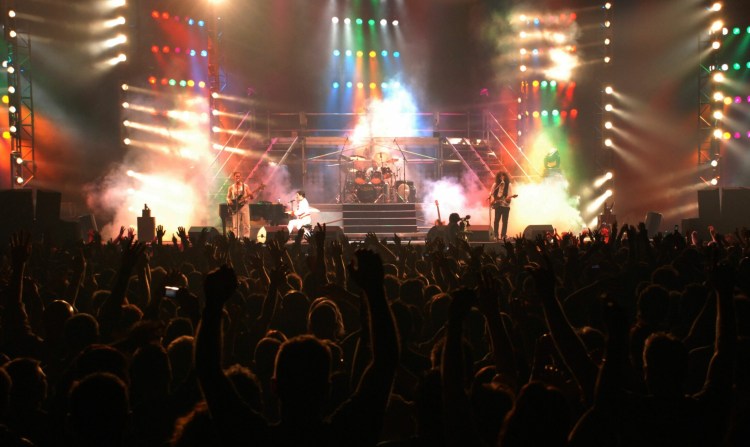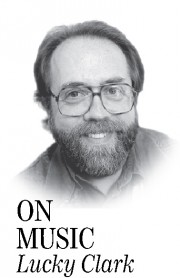Having seen Queen live in concert a couple of times over the years, having all of their albums, and having the honor to interview Brian May back in 1993 when he came to the Augusta Civic Center opening for Guns ‘N’ Roses back on March 16, 1993, to say I am a huge fan would be an understatement. So, when I discovered that the premiere Queen tribute band — Killer Queen — was coming to that same venue in Augusta on Wednesday, April 17, of this year, I just had to interview a member of that group. The quartet is made up of Simon Small (Brian May), Jonathan Howells (Roger Taylor) and Bradley Waissman (John Deacon). I was fortunate that lead singer/keyboardist Patrick Myers (Freddie Mercury) was willing to chat with me about their upcoming performance in our state capital and talk about how the group got together. He called me at the end of February and we talked for 39 minutes. Needless to say, I don’t have enough room for the entire interview, but this will run a bit longer than most of my columns.
Q: To begin with, where are you calling from? This connection is so clean that you must be stateside now.
Myers: No, I’m calling from just outside of London — I’m glad the reception’s so good.
Q: Me, too. How long has Killer Queen been going on? How long have you been doing this?
Myers: Quite a long time, actually, more decades than I care to remember (chuckle). We started back in 1993 when we were very young college students and it’s just been going ever since, really. We all left home the same year that Freddie died. It was in the fall of ’91, eight to 10 weeks into that first term, that we got the news that Freddie was ill and suddenly had passed too. It was all a bit of a shock.
Q: Had you ever seen Queen live?
Myers: We were too young to have seen their last tour, which was back in ’86 when they were in Europe. We had seen footage of it, but knew that there was no way to see an evening of Queen music, because they were never going to tour again. As far as we were all concerned, Queen was still the biggest band because their music was really, really great, so we were just shocked and horrified that that had happened and that Freddie was gone, so we just started playing their music. That led, a couple of years later, to us deciding to bite the bullet and do a concert with the whole costumes and stuff.
Q: Where was that concert?

Patrick Myers as Freddie Mercury of the Queen tribute band Killer Queen. Photo courtesy of Killer Queen
Myers: It was at our college in front of a thousand of our fellow students. It was a bit of a gamble and terrifying, because we thought the audience was just going to kill us: no one was going to want to see someone pretending to be Queen, because there wasn’t the tribute thing happening at that time. For us, it wasn’t in any way a given that an audience would buy this as a concept at all, but actually that first show was warmly received. The bizarre thing was that was where Queen started: the University of London — that was where they all met — it was a weird parallel because that’s where we met. The other bizarre thing was that everyone there, we as the band and the students as the audience, would have missed out on seeing Queen live, because everyone was the same age, so we were all hearing the music live and having that Queen-live experience for the first time: both the band and the audience.
Q: That must have been a hell of a rush for all present, then.
Myers: Yeah, we all kind of got off on it at the same time. It was like, “wow!” When you play the stuff live you realize how powerful the music is. Well, after that first show a guy came up to us and asked if we wanted to tour and after a millisecond we said, “Sure!” So, as far as we were concerned, as exciting as the idea of doing a tour was, the idea that we could keep doing this again was brilliant; because, the thoughts of doing it at first was terrifying, and it became brilliantly fun as a thing for us to do.
Q: And it just kept growing?
Myers: Yeah, we got the West End calling straight away almost within a few months of that, then the Cabana the year after that, and then we started doing stuff abroad. Then that led to bigger stuff abroad and then the arenas in the next century were getting in touch and saying, “Well, we’d like to see your show in the same place that Queen did it — do you think that would work?” And just like before, we just went, “Sure!” (laughter) — we’re not going to say, “no!” Then America calls and asks, “Do you want to play Red Rocks?” and again we went, “Well, yeah, why not?!” And so it just keeps on growing. I mean we’ve played the same places as Queen and sold them out a few times now, so we think things have finally peaked; then something comes along, like this new film coming out, it’s just gone insane now.
Q: Speaking of that movie, what do you think of “Bohemian Rhapsody”?
Myers: I think it tells the story really well. It’s brought a whole new level of excitement all across the world about Queen and the reactions we’ve been getting are an after-effect of the film and have been amazing … We were blown away by it.
Q: Back to what you guys do in concert. With all that material that Queen generated, how do you put together a set list?
Myers: Well, yeah, good question. That’s sort of the fun of it, really, for us. There’s a lot of material and there are two parts to the equation: there are the “must haves,” and Queen has a lot of “must haves,” so those take up a chunk of the set.

Patrick Myers as Freddie Mercury of the Queen tribute band Killer Queen. Photo courtesy of Killer Queen
Q: Like their greatest hits, right?
Myers: Yeah, their greatest hits are fantastic. There are so many amazing songs that are fun for us to play. That said, there’s also real treasure trove of “hidden gems” that we love to put in. You can’t do a whole show of them unfortunately, as much as I would love to. But putting the “hidden gems” is something that we love to do, because it’s nice to introduce stuff that you know sections of the audience won’t have heard, but you know the other sections of the audience, who really know the albums, will have heard. There are an amazing amount of songs that are kind of like neglected singles that you can put in. So, we try to surprise the audience with a few track that they won’t be expecting to hear, and hearing the reaction of those tracks is always great.
Q: One of the things that always impressed me about Queen was the variations of styles they would present throughout the span of their career, even within the span of a single album, for that matter.
Myers: Well, that makes it kind of like a pleasure, because in any show you need to put light and shade in. You need to have contrasts; you need to work with different rhythmic builds. You can’t just lump any songs together. It’s like a machine, really, putting a set list together. Queen’s material is so varied that it really helps with that.
Q: Did you ever think that Killer Queen would grow into what it’s become?
Myers: We didn’t expect to do this beyond the summer that we rolled the dice and jumped on stage and hoped for the best. We certainly didn’t expect to be doing it in a year let alone 26 years, you know?
Q: How do you view Queen as a whole?
Myers: Their whole body of work, that goes from dreamy kids who haven’t had a life yet to having the life and saying goodbye to it, from a rock ‘n’ roll band’s point-of-view, is unheard of. No other band really does that and hasn’t done it to the same effect certainly, if they had hung around together. I think it’s extraordinary, so as a performing artist you couldn’t ask for better material.
Q: Do you get over to the states a lot?
Myers: We had offers to come over, but we kind of held back, but when they asked us to do Red Rocks we said yes right away, because it was such a perfect way to start America. That was back in 2016 and we did sort of a toe-in-the-water tour. Then we came back and did a lot more dates the second time around, and last year we doubled it again, and this time we’re doing about nine weeks over in America this year. Not all in a row, because it’s so difficult to schedule nine weeks and keep everywhere else in the world happy (chuckle). So, we’ll be breaking it into three-week blocks with tours over here and in Scandinavia and Russia in between those blocks in the U.S. There is a massive worldwide hunger for this music. America, though, has always been close to my heart as a place. I’m half American: my mum was American, so I spent some time there as a kid and went to school there for a while.
Q: And now, on April 17 you’ll be kicking off the 2019 U.S. tour in Augusta, Maine. So, Patrick, here’s my final question: Is there anything that you’d like me to pass on to the folks reading this article?
Myers: Um, that’s an interesting question, actually; I hadn’t thought of it from that point of view. Queen, right from the get-go, made the audience part of the show with songs like “We Will Rock You” and “We Are The Champions.” They were written so the audience would be there and have something that they could physically contribute to the show. Queen redefined what rock ‘n’ roll could be, they drew that blueprint for the perfect rock ‘n’ roll concert. And, that’s what our mission statement is: That feeling and that energy that kind of lives with you and bonds with you days and days after the show. That what we want to give everyone and share, so, if that’s your bag (chuckle), come and see us.
Lucky Clark has spent 50 years writing about good music and the people who make it. He can be reached at luckyc@myfairpoint.net if you have any questions, comments or suggestions.
Send questions/comments to the editors.



